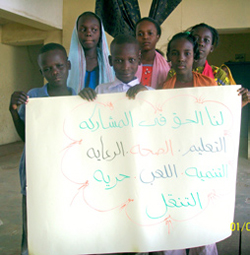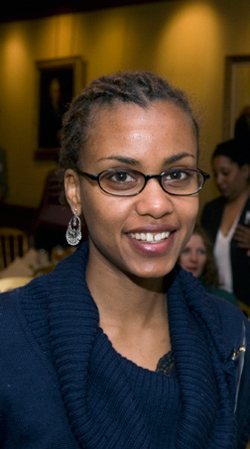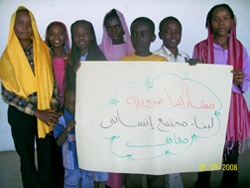Filed Under > TC Entrepreneurs
Mission: Darfur
Nisrin Elamin (MA, 2000) helps a beleaguered land meet the challenges of daily life.
Nisrin Elamin (MA, 2000) helps a beleaguered land meet the challenges of daily life.
During her trip to the Darfur region of Sudan in the summer of 2009, Nisrin Elamin visited an open-air classroom in one of the many camps for people displaced by the area’s long running war. There were 200 students from ages three to 11 and just one teacher.
“Being a teacher myself, I was just looking at it, baffled by how the teacher managed to bring all these students to learn something,” says Elamin, who graduated from TC in 2009 with a master’s in International and Transcultural Studies.
Elsewhere, Elamin, who was traveling with a Darfurian underground radio journalist, found that a center where teenagers learned income-generating skills—welding, weaving, furniture-making—had shut down. The reason? The departure of major international aid groups, ejected by the Sudanese authorities in March 2009 in retaliation for the war crimes indictment of President Omar al-Bashir by the International Criminal Court (ICC).
Yet Elamin, 33, also found that in the camps—virtual small cities that have now been in place for over seven years—life goes on. The departure of the big aid groups, though damaging, has given rise to ongoing grassroots initiatives in everything from vegetable cultivation to educational theater, to a volunteer-run school for deaf students, as well as a growing network of local NGOs to support them.
“Emergency relief is very important,” Elamin says, “especially in terms of water, food, health and sanitation, but people were also talking about being independent. Not to be dependent on handouts, but to have their own income and take care of their families.”
That reality differs from the squalor and desperation often depicted by the media, and also from what Elamin, who is Sudanese but grew up mostly in Germany, has heard on visits back home. Her relatives in Sudan live in the north near the capital, Khartoum, and whatever they knew about the war in Darfur and the even longer conflict in the country’s south was largely second-hand.
“I couldn’t tell a lot of my older aunts that I was going there,” she says of her trip to Darfur. “It would have been too much.” Yet, Elamin says, people travel daily back and forth, on domestic airlines, between Khartoum and Darfur’s main cities.
Elamin has made it her mission to support Darfurians in meeting the challenges of daily life. She raises funds for small-scale projects vetted by her contacts on the ground, and has been connecting Darfurian-led NGOs to U.S. funders through Skype and email. She speaks to the media and at schools and conferences in the United States, and shares perspectives from the region on her Web site, www.supportdarfur.org.
Elamin has also made her advocacy for Darfur part of her work as a senior trainer at Global Kids, which runs after-school programs for urban youth at 11 sites in New York City. At Long Island City High School in Queens in 2009, Elamin linked a group of students—most with immigrant backgrounds, ranging from El Salvador to Bangladesh—with a youth theater group in Darfur.
“We asked the group how we could be helpful,” Elamin says. “They said they wanted to buy instruments to start a band, and equipment for literacy classes. The students came up with the idea of a talent show in school.” They sent $1,000 and within a few weeks, they got back photos of the new classes in Darfur that they had funded.
This year, Elamin hopes to raise awareness of Darfur at her new work site, Paul Robeson High School in Crown Heights, Brooklyn. She has also brought New York youth to media events and conferences, and helped them develop a workshop for teaching their peers about Darfur.
Elamin says it isn’t always easy to balance the stresses of helping city youth—her duties include home visits and tracking down infrequent attendees—with her commitment to Darfur. Today’s communications technology helps, she says, and being in New York is a “strategic position” with access to aid and policy networks and a growing Sudanese diaspora in the United States that, she says, is starting to get organized.
Down the line, Elamin imagines she will earn a Ph.D. and divide her time between the United States and Africa—hopefully Sudan if the situation there gets better.
“I know what I’m doing is not going to solve the conflict and save the world,” she says. “But I felt a responsibility to do my part. And that part—small as it is—is meaningful in that it offers a model that is different.”
Published Monday, Dec. 20, 2010



